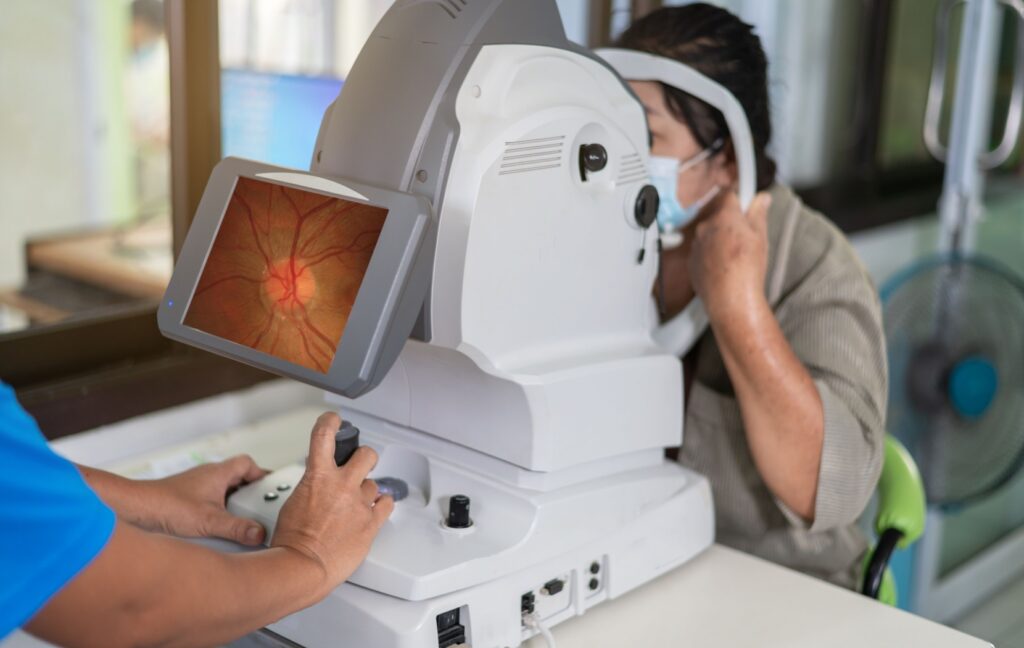November is Diabetes Awareness Month in Canada! Diabetes affects 1 in 10 Canadians over the age of 20. Diabetes affects your body, but did you know it can impact your vision too?
In fact, the signs of diabetes can actually show up in your eyes before they show up in the rest of your body. By scheduling regular adult eye exams, you make it possible for your optometrist to detect diabetes in its early stages, leading to potentially better outcomes.
What is Diabetes?
Diabetes is a health condition where the body can’t regulate blood sugar properly. This happens because the body either struggles to produce enough insulin or can’t use insulin properly. As a consequence, managing blood sugar levels becomes difficult.
Diabetes can lead to a variety of health issues which include:
- Kidney issues or kidney failure
- Foot and leg issues including swelling, wounds, or amputation.
- Eye diseases and vision loss
- Nerve damage
- Increased risk of heart attacks and strokes.
However, diabetes doesn’t always have to lead to extreme medical complications and vision loss. Rather, if managed well through optimizations of medication and lifestyle factors, it will reduce an individual’s risk of severe impact.
What Causes Diabetes?
Diabetes can occur due to a variety of factors. Type 1 diabetes is caused by an autoimmune disorder that destroys the cells in your body responsible for creating insulin, and usually appears in childhood.
Type 2 diabetes develops later in life when the body either develops insulin resistance or struggles to produce enough insulin. Lifestyle factors like diet and exercise can contribute to the condition, but they’re not the only factors. Genetics, ethnicity, and environmental factors all contribute to a person’s risk of developing diabetes.
How Does Diabetes Affect Your Eyes?
High blood sugar can damage the small blood vessels in your eyes, leading to diabetic retinopathy. Diabetes with poorly controlled sugars can lead to vascular damage which affects blood flow and oxygen to the retinal tissue.
In some cases of diabetic retinopathy, new irregular blood vessels start to grow. These abnormal blood vessels can leak fluids and lipids. Eventually, scar tissue buildup from these new blood vessels can cause the retina to detach from the back of the eye or create other causes of permanent vision loss.
Basic symptoms of diabetic retinopathy may include:
- Floater or spots in vision
- Blurred vision
- Fluctuating vision
- Central vision distortion
Can An Eye Exam Detect Diabetes?
The early stages of diabetic retinopathy may not affect your vision, but the condition still leaves retinal findings that your optometrist can see during an eye exam. In fact, they may be able to detect the signs of diabetic retinopathy before other symptoms of diabetes appear.
Annual eye exams can help you monitor for diabetes and begin prevention or treatment sooner, especially if you’re at high risk.
How Do Optometrists Test for Diabetes?
Optometrists don’t specifically test for diabetes, they use multiple tests to look for signs of diabetes. During an eye exam, your optometrist will test your refractive error to test the quality of your vision. They’ll also use various microscopes and imaging tools to look at the inside of your eyes to review the blood vessels in your eyes.
Sometimes, to look at the inside of the eyes, optometrists will use a retinal camera to take a wide-angled view of the inside of your retina and often they will also use optical coherence tomography to get cross-section images of the retina to look for any swelling due to diabetic retinopathy.
Your optometrist is part of your healthcare team. By monitoring an individual’s diabetic retinopathy or risk factors for it, they will be able to relay information to your general physician if there are signs of progression or a problem. This monitoring can help your healthcare team make treatment decisions.
Early Detection of Diabetes

Early detection of diabetes is crucial for successful diabetes management. Research has shown that early diagnosis and treatment are associated with better health outcomes. Early treatment of diabetic retinopathy also significantly reduces your risk of blindness.
Get a Diabetic Eye Exam Today
November is Diabetes Awareness Month in Canada. To learn more about the impacts of diabetes on Canadians and the factors that might put you at risk, visit Diabetes Canada.
Regular eye exams are vital for everyone, but they’re particularly important for those at risk of diabetes. Early detection through an eye exam can help you start managing your diabetes and prevent complications.
Northern Lights Optometry offers diabetic eye exams in Whitehorse for individuals with diabetes or at a high risk of diabetes. Contact us or book an appointment today to learn more about our eye care services!





